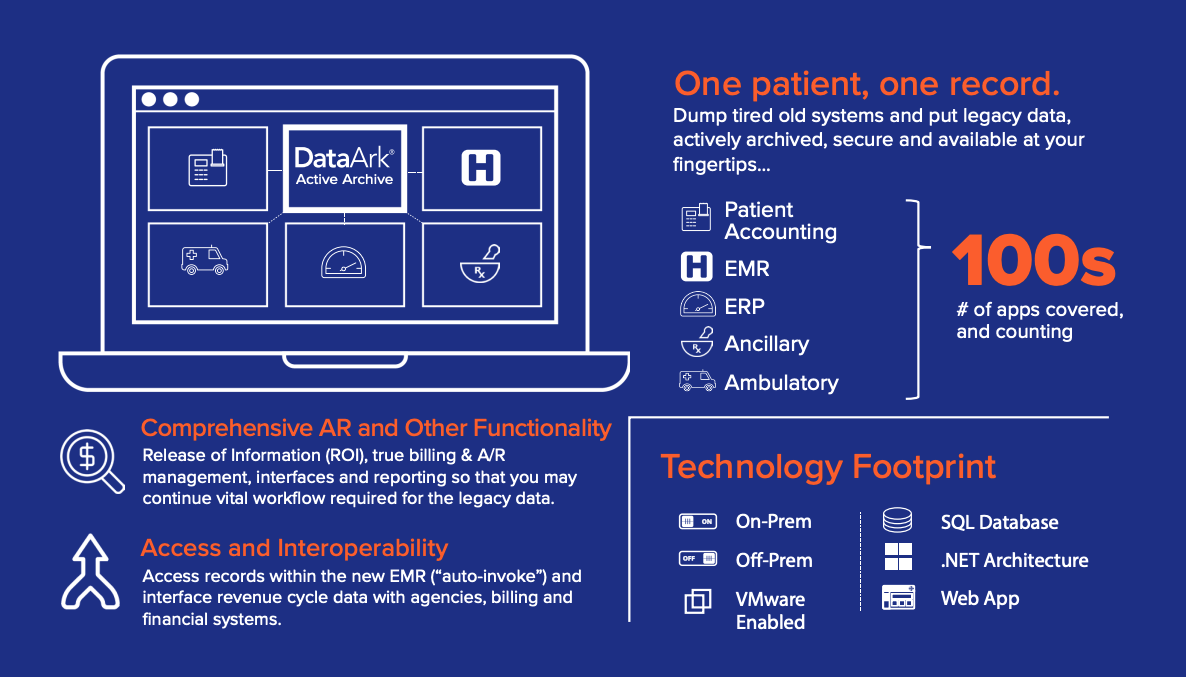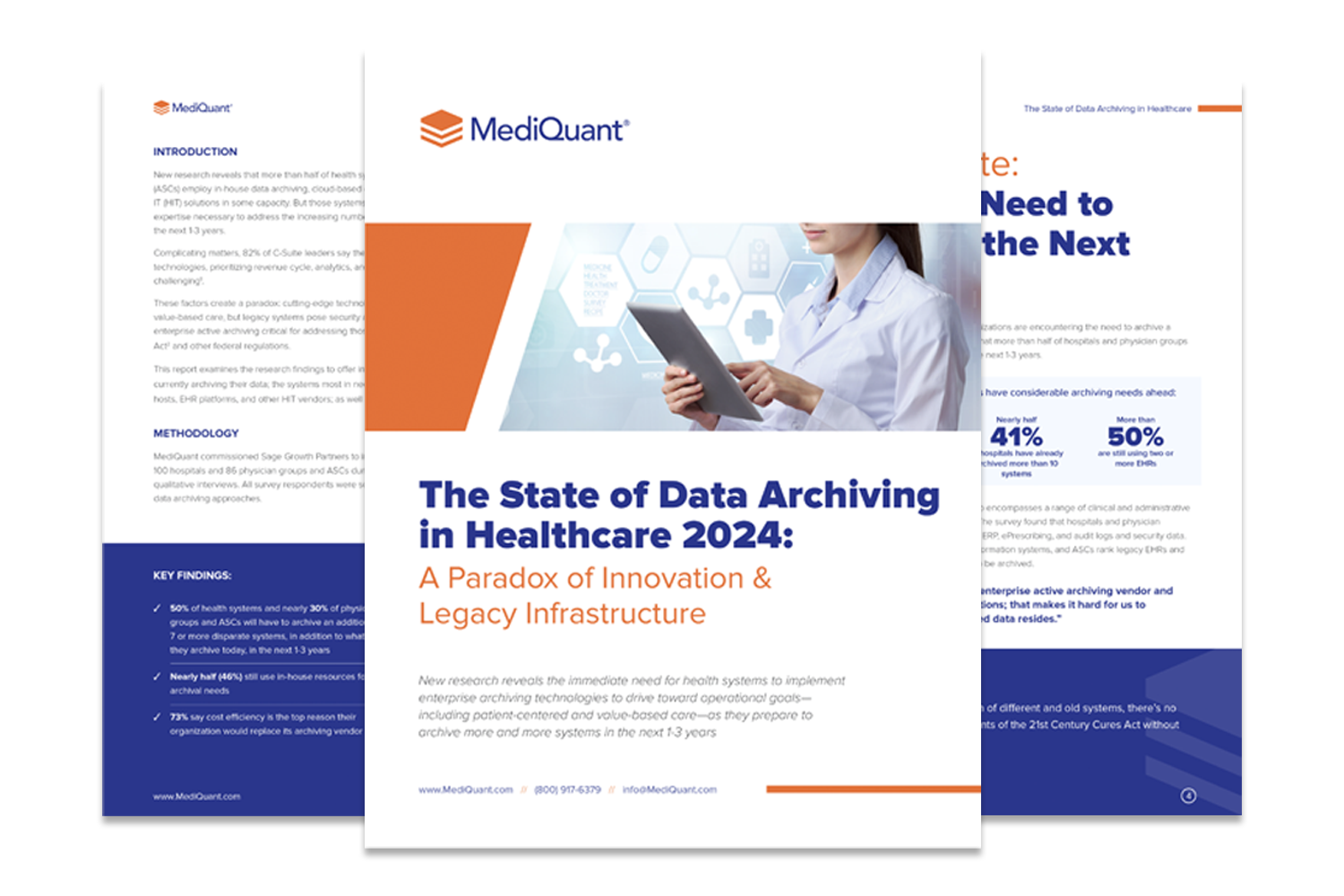Santa Clara Valley Health and Hospital System preserves access to patient healthcare records during data archiving and legacy decommissioning project with the DataArk software solution.
Archiving Solution Makes Life Simple for Physicians
Santa Clara Valley Health and Hospital System (Santa Clara) in Santa Clara, California, needed a software solution that would enable storage of its legacy system healthcare data and meet regulatory compliance requirements. DataArk®, a user-friendly active archiving system, stood out among other data archiving solutions for its easy-to-use platform and long-term archiving capabilities.
Profile
Comprised of Santa Clara Valley Medical Center and Ambulatory Care Clinics, Behavioral Health Services Department, Public Health Department, Custody Health Services and Valley Health Plan, Santa Clara is dedicated to the health and well-being of all of Santa Clara County’s residents.
Owned and operated by the county, Santa Clara is a 574-bed, acute care public teaching facility. It serves as a “safety net” for the entire community, providing high-quality medical care regardless of a patient’s ability to pay. It also delivers specialized care including a burn center, diabetes center, trauma center, rehabilitation center, children’s health center, and women’s health center.

The Challenge
Santa Clara went live with the first phase of a full Epic Enterprise Solution in the spring of 2013. After phase one, the hospital system faced the task of decommissioning the legacy applications being replaced by Epic.
When hospitals implement new data management systems that store patient records, they must still be able to access and manage the data on their old systems, making legacy system decommissioning one of the biggest challenges they face. To this point, all-encompassing, configurable solutions seemingly did not exist.
NextGen Ambulatory EHR was one of the applications Santa Clara was set to decommission. The software included vital patient medical history that helped Santa Clara optimize patient care and maintain data availability, as required by law. Unfortunately, when Santa Clara transitioned from NextGen to Epic, some patients’ Continuity of Care Documents (CCDs) did not transition in a useable format. In fact, the transition was only successful for about 70 percent of patients. NextGen also housed information still needed for clinical care that wasn’t available on the transitioned CCDs. Santa Clara considered building a read-only database as a workaround, but the effort would have exhausted resources and cost more than the return on investment. In addition, a read-only database would have been rendered useless the moment any new patient information was acquired.

Due to these unforeseen compatibility issues, Santa Clara needed a software solution that met the use case for all individuals who required access, and they needed continued guidance and support from the software provider. Santa Clara also required the ability to move and remove patient data as it aged and emphasized that long-term data management in a user-friendly interface was imperative for project success.
The Solution
MediQuant evaluated Santa Clara’s key requirements and proposed DataArk® as a solution for their clinical archiving needs. Rather than providing Santa Clara with a “portal” to multiple systems containing different data structures, DataArk consolidated their disparate data into a single common framework with one interface and one access point. It offered an easy-to-use platform that minimized the burden on Santa Clara’s healthcare professionals.
In addition, DataArk’s active archive function allowed full accessibility and modification of patient records during the decommissioning process, enabling physicians to provide optimal, timely and cost-effective care throughout the entire transition without disruption.
“We knew we needed to make accessing patient records as easy and straightforward as possible so Santa Clara could focus on providing top-notch patient care. DataArk provided the access they needed during and after the decommissioning process.”


Why Active Archive with DataArk?
1. Active archiving grants users the necessary functionality of a legacy system without the expense and risks. Data is kept active for quickly retrieving files, easily updating old records and continuing to bill accounts.
2. To reduce risk of lost or misplaced data, and to meet transfer deadlines, data is migrated instead of converted.
3. DataArk serves as a single access point where many different legacy applications can be consolidated to simplify the IT landscape. With DataArk’s auto-invoke feature, archived data can be accessed from within the new EMR at the push of a button.
Implementation
Having completed archiving projects at over 400 facilities since the first DataArk installation in 2001, MediQuant understands that hands- on consultation is central to every DataArk implementation. The MediQuant Project Management/Account Management team worked with Santa Clara project managers to identify their unique software requirements and understand how best to plan and execute an enterprise-wide archival initiative. Considerations included:
• Epic conversion timelines
• Operational usage
• Software/hardware support termination dates and cost
• Available Santa Clara resources
For the DataArk implementation, a Santa Clara physician project team, led by Dr. Andrea Cervenka, identified critical data and ensured accurate transition. “Physician involvement was critical,” Dr. Cervenka said, stressing that their participation empowered them to control which records were included and customize the data to fit their needs.
“Whenever there was a concern or request, the MediQuant team made necessary adjustments and let us know once they were complete so we could test the change. The open, continuous communication and cooperation MediQuant provided us was imperative to the success of the project.”
The Results
With DataArk in place, Santa Clara was able to decommission the legacy system and appreciate significant cost savings. Physicians can now easily access clinical records such as lab results, immunization history and order history right from Epic using DataArk’s auto-invoke feature, allowing users to view both current and historical data. Plus, their data is secure and accessible from any location, including physician offices.
Users are pleased with the high-level configuration options. They can design a flow sheet to track adult immunizations, previously lacking in their records, and rearrange existing flow sheets to better suit their needs.
They’re also delighted by the ease of navigation. “It is so much easier to navigate than I expected,” said Dr. Cervenka, adding that end-users required only minimal training. She also reinforced the link between accessible records and the highest quality of care, stating, “This was not a project to rush. It took time to ensure all necessary data was included but, in the long run, it has made our jobs much easier and our patients have continued to receive first-rate care without interruption.”
“MediQuant was able to accommodate almost everything we requested. Some of our requests were not technically possible, and even in such cases they were very helpful in taking that extra step to address all of our inquiries.”


